Brooking T. The History of New Zealand
Подождите немного. Документ загружается.

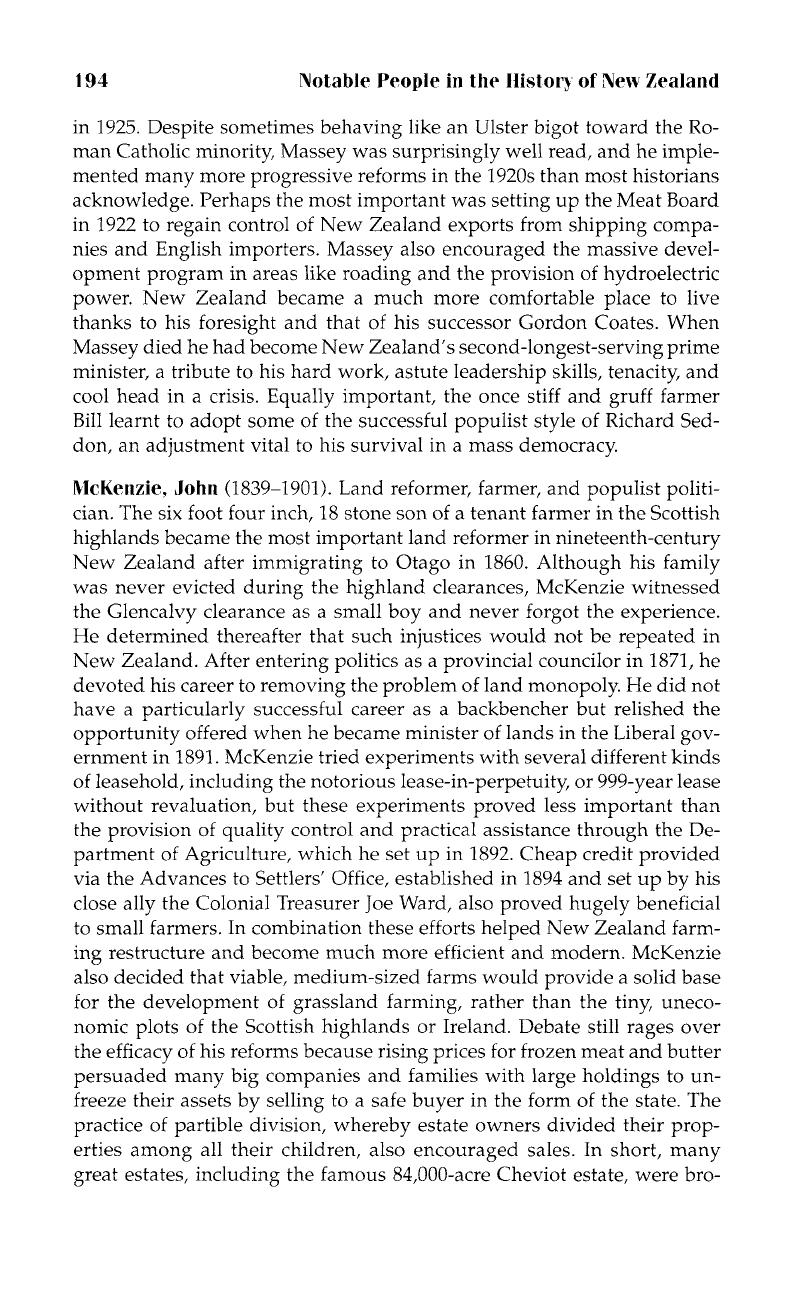
194 Notable People in the
History
of New Zealand
in 1925. Despite sometimes behaving like an Ulster bigot toward the Ro-
man Catholic minority, Massey was surprisingly well read, and he imple-
mented many more progressive reforms in the
1920s
than most historians
acknowledge. Perhaps the most important was setting up the Meat Board
in 1922 to regain control of New Zealand exports from shipping compa-
nies and English importers. Massey also encouraged the massive devel-
opment program in areas like roading and the provision of hydroelectric
power. New Zealand became a much more comfortable place to live
thanks to his foresight and that of his successor Gordon Coates. When
Massey died he had become New Zealand's second-longest-serving prime
minister, a tribute to his hard work, astute leadership skills, tenacity, and
cool head in a crisis. Equally important, the once stiff and gruff farmer
Bill learnt to adopt some of the successful populist style of Richard Sed-
don, an adjustment vital to his survival in a mass democracy
McKenzie, John (1839-1901). Land reformer, farmer, and populist politi-
cian. The six foot four inch, 18 stone son of a tenant farmer in the Scottish
highlands became the most important land reformer in nineteenth-century
New Zealand after immigrating to Otago in 1860. Although his family
was never evicted during the highland clearances, McKenzie witnessed
the Glencalvy clearance as a small boy and never forgot the experience.
He determined thereafter that such injustices would not be repeated in
New Zealand. After entering politics as a provincial councilor in 1871, he
devoted his career to removing the problem of land monopoly. He did not
have a particularly successful career as a backbencher but relished the
opportunity offered when he became minister of lands in the Liberal gov-
ernment in
1891.
McKenzie tried experiments with several different kinds
of leasehold, including the notorious lease-in-perpetuity, or 999-year lease
without revaluation, but these experiments proved less important than
the provision of quality control and practical assistance through the De-
partment of Agriculture, which he set up in 1892. Cheap credit provided
via the Advances to
Settlers'
Office, established in 1894 and set up by his
close ally the Colonial Treasurer Joe Ward, also proved hugely beneficial
to small farmers. In combination these efforts helped New Zealand farm-
ing restructure and become much more efficient and modern. McKenzie
also decided that viable, medium-sized farms would provide a solid base
for the development of grassland farming, rather than the tiny, uneco-
nomic plots of the Scottish highlands or Ireland. Debate still rages over
the efficacy of his reforms because rising prices for frozen meat and butter
persuaded many big companies and families with large holdings to un-
freeze their assets by selling to a safe buyer in the form of the state. The
practice of partible division, whereby estate owners divided their prop-
erties among all their children, also encouraged sales. In short, many
great estates, including the famous 84,000-acre Cheviot estate, were bro-
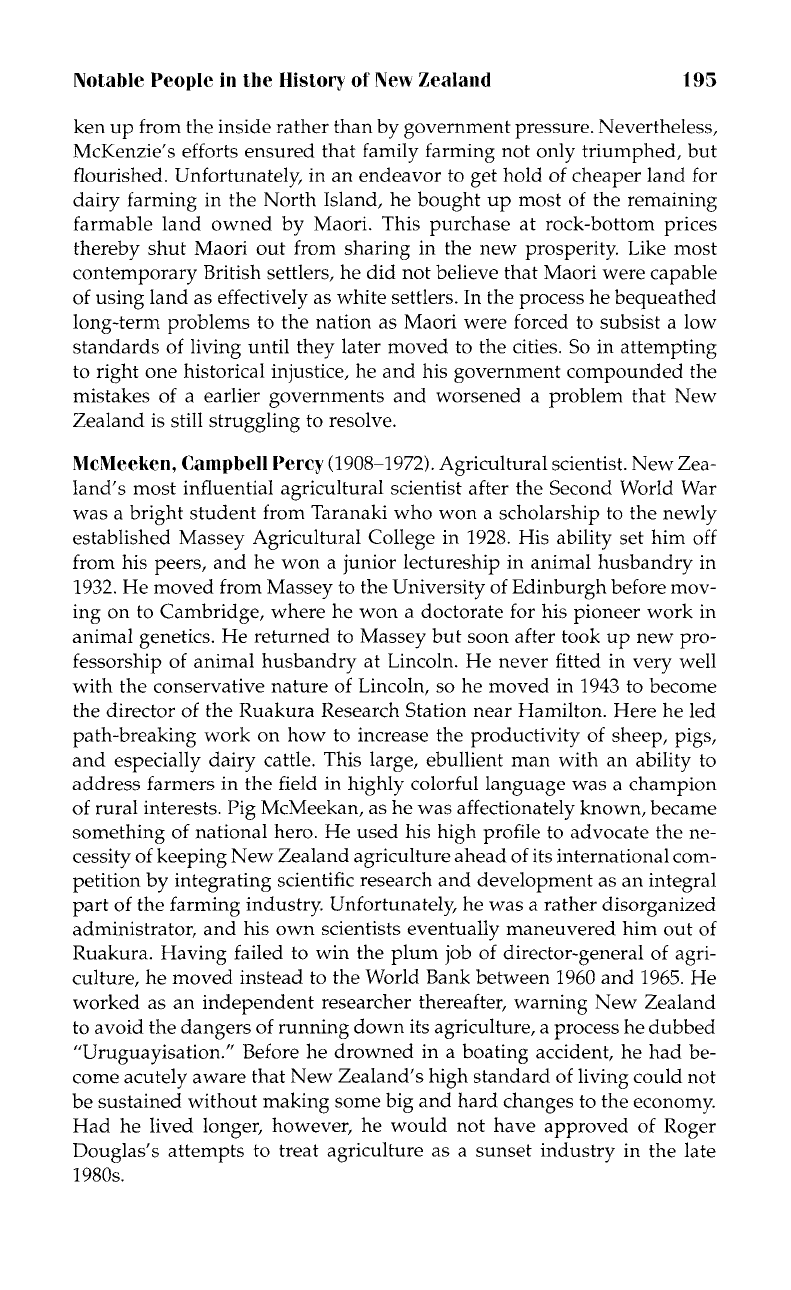
Notable People in the History of New Zealand
195
ken up from the inside rather than by government pressure. Nevertheless,
McKenzie's
efforts ensured that family farming not only triumphed, but
flourished. Unfortunately, in an endeavor to get hold of cheaper land for
dairy farming in the North Island, he bought up most of the remaining
farmable land owned by Maori. This purchase at rock-bottom prices
thereby shut Maori out from sharing in the new prosperity. Like most
contemporary British settlers, he did not believe that Maori were capable
of using land as effectively as white settlers. In the process he bequeathed
long-term problems to the nation as Maori were forced to subsist a low
standards of living until they later moved to the cities. So in attempting
to right one historical injustice, he and his government compounded the
mistakes of a earlier governments and worsened a problem that New
Zealand is still struggling to resolve.
McMeeken, Campbell Percy (1908-1972). Agricultural scientist. New Zea-
land's most influential agricultural scientist after the Second World War
was a bright student from Taranaki who won a scholarship to the newly
established Massey Agricultural College in 1928. His ability set him off
from his peers, and he won a junior lectureship in animal husbandry in
1932.
He moved from Massey to the University of Edinburgh before mov-
ing on to Cambridge, where he won a doctorate for his pioneer work in
animal genetics. He returned to Massey but soon after took up new pro-
fessorship of animal husbandry at Lincoln. He never fitted in very well
with the conservative nature of Lincoln, so he moved in 1943 to become
the director of the Ruakura Research Station near Hamilton. Here he led
path-breaking work on how to increase the productivity of sheep, pigs,
and especially dairy cattle. This large, ebullient man with an ability to
address farmers in the field in highly colorful language was a champion
of rural interests. Pig McMeekan, as he was affectionately known, became
something of national hero. He used his high profile to advocate the ne-
cessity of keeping New Zealand agriculture ahead of its international com-
petition by integrating scientific research and development as an integral
part of the farming industry. Unfortunately, he was a rather disorganized
administrator, and his own scientists eventually maneuvered him out of
Ruakura. Having failed to win the plum job of director-general of agri-
culture, he moved instead to the World Bank between 1960 and 1965. He
worked as an independent researcher thereafter, warning New Zealand
to avoid the dangers of running down its agriculture, a process he dubbed
"Uruguayisation." Before he drowned in a boating accident, he had be-
come acutely aware that New Zealand's high standard of living could not
be sustained without making some big and hard changes to the economy.
Had he lived longer, however, he would not have approved of Roger
Douglas's attempts to treat agriculture as a sunset industry in the late
1980s.
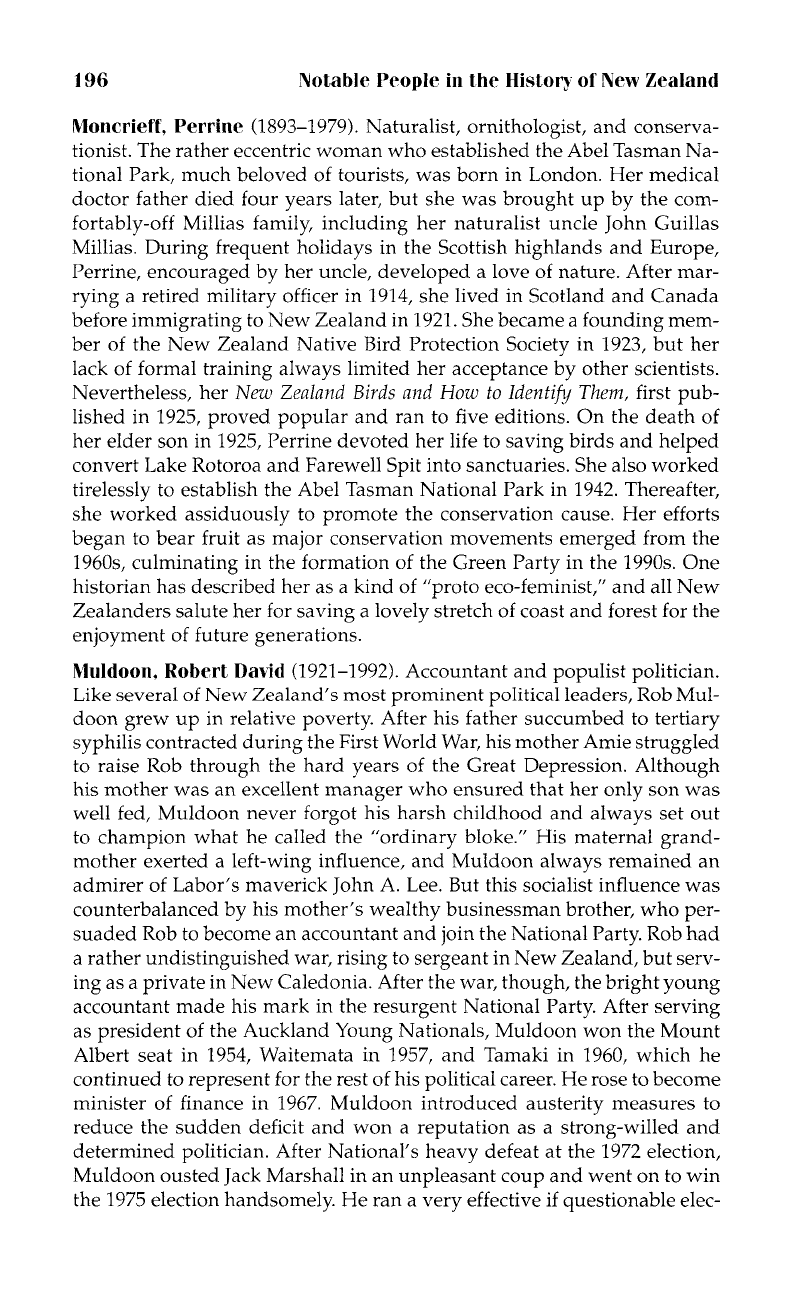
196 Notable People in the
History
of New Zealand
Moncrieff, Perrine (1893-1979). Naturalist, ornithologist, and conserva-
tionist. The rather eccentric woman who established the Abel Tasman Na-
tional Park, much beloved of tourists, was born in London. Her medical
doctor father died four years later, but she was brought up by the
com-
fortably-off
Millias family, including her naturalist uncle John Guillas
Millias. During frequent holidays in the Scottish highlands and Europe,
Perrine, encouraged by her uncle, developed a love of nature. After mar-
rying a retired military officer in 1914, she lived in Scotland and Canada
before immigrating to New Zealand in
1921.
She became a founding mem-
ber of the New Zealand Native Bird Protection Society in 1923, but her
lack of formal training always limited her acceptance by other scientists.
Nevertheless, her New Zealand Birds and How to Identify Them, first pub-
lished in 1925, proved popular and ran to five editions. On the death of
her elder son in 1925, Perrine devoted her life to saving birds and helped
convert Lake Rotoroa and Farewell Spit into sanctuaries. She also worked
tirelessly to establish the Abel Tasman National Park in 1942. Thereafter,
she worked assiduously to promote the conservation cause. Her efforts
began to bear fruit as major conservation movements emerged from the
1960s, culminating in the formation of the Green Party in the 1990s. One
historian has described her as a kind of "proto eco-feminist," and all New
Zealanders salute her for saving a lovely stretch of coast and forest for the
enjoyment of future generations.
Muldoon, Robert David (1921-1992). Accountant and populist politician.
Like several of New Zealand's most prominent political leaders, Rob Mul-
doon grew up in relative poverty. After his father succumbed to tertiary
syphilis contracted during the First World War, his mother
Amie
struggled
to raise Rob through the hard years of the Great Depression. Although
his mother was an excellent manager who ensured that her only son was
well fed, Muldoon never forgot his harsh childhood and always set out
to champion what he called the "ordinary bloke." His maternal
grand-
mother exerted a left-wing influence, and Muldoon always remained an
admirer of Labor's maverick John A. Lee. But this socialist influence was
counterbalanced by his mother's wealthy businessman brother, who per-
suaded Rob to become an accountant and join the National Party. Rob had
a rather undistinguished war, rising to sergeant in New Zealand, but serv-
ing as a private in New Caledonia. After the war, though, the bright young
accountant made his mark in the resurgent National Party. After serving
as president of the Auckland Young Nationals, Muldoon won the Mount
Albert seat in 1954, Waitemata in 1957, and
Tamaki
in 1960, which he
continued to represent for the rest of his political career. He rose to become
minister of finance in 1967. Muldoon introduced austerity measures to
reduce the sudden deficit and won a reputation as a strong-willed and
determined politician. After National's heavy defeat at the 1972 election,
Muldoon ousted Jack Marshall in an unpleasant coup and went on to win
the 1975 election handsomely. He ran a very effective if questionable
elec-
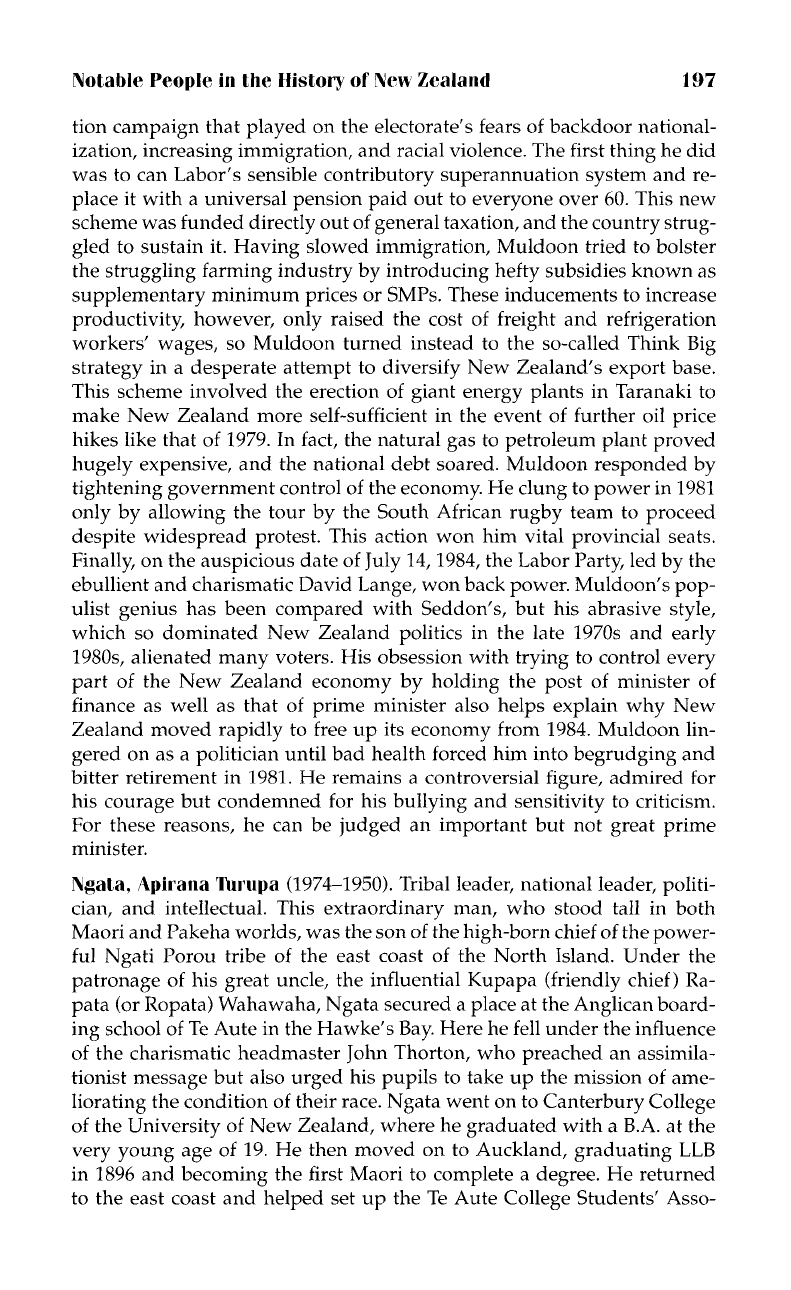
Notable People in the History of New Zealand
197
tion campaign that played on the electorate's fears of backdoor national-
ization, increasing immigration, and racial violence. The first thing he did
was to can Labor's sensible contributory superannuation system and re-
place it with a universal pension paid out to everyone over 60. This new
scheme was funded directly out of general taxation, and the country strug-
gled to sustain it. Having slowed immigration, Muldoon tried to bolster
the struggling farming industry by introducing hefty subsidies known as
supplementary minimum prices or SMPs. These inducements to increase
productivity, however, only raised the cost of freight and refrigeration
workers' wages, so Muldoon turned instead to the so-called Think Big
strategy in a desperate attempt to diversify New Zealand's export base.
This scheme involved the erection of giant energy plants in Taranaki to
make New Zealand more self-sufficient in the event of further oil price
hikes like that of 1979. In fact, the natural gas to petroleum plant proved
hugely expensive, and the national debt soared. Muldoon responded by
tightening government control of the economy. He clung to power in 1981
only by allowing the tour by the South African rugby team to proceed
despite widespread protest. This action won him vital provincial seats.
Finally, on the auspicious date of July
14,1984,
the Labor Party, led by the
ebullient and charismatic David Lange, won back power. Muldoon's pop-
ulist genius has been compared with Seddon's, but his abrasive style,
which so dominated New Zealand politics in the late 1970s and early
1980s, alienated many voters. His obsession with trying to control every
part of the New Zealand economy by holding the post of minister of
finance as well as that of prime minister also helps explain why New
Zealand moved rapidly to free up its economy from 1984. Muldoon lin-
gered on as a politician until bad health forced him into begrudging and
bitter retirement in 1981. He remains a controversial figure, admired for
his courage but condemned for his bullying and sensitivity to criticism.
For these reasons, he can be judged an important but not great prime
minister.
Ngata, Apirana Turupa (1974-1950). Tribal leader, national leader, politi-
cian, and intellectual. This extraordinary man, who stood tall in both
Maori and Pakeha worlds, was the son of the high-born chief of the power-
ful Ngati Porou tribe of the east coast of the North Island. Under the
patronage of his great uncle, the influential Kupapa (friendly chief) Ra-
pata (or Ropata) Wahawaha, Ngata secured a place at the Anglican board-
ing school of Te Aute in the Hawke's Bay. Here he fell under the influence
of the charismatic headmaster John Thorton, who preached an assimila-
tionist message but also urged his pupils to take up the mission of ame-
liorating the condition of their race. Ngata went on to Canterbury College
of the University of New Zealand, where he graduated with a B.A. at the
very young age of
19.
He then moved on to Auckland, graduating LLB
in 1896 and becoming the first Maori to complete a degree. He returned
to the east coast and helped set up the Te Aute College Students' Asso-
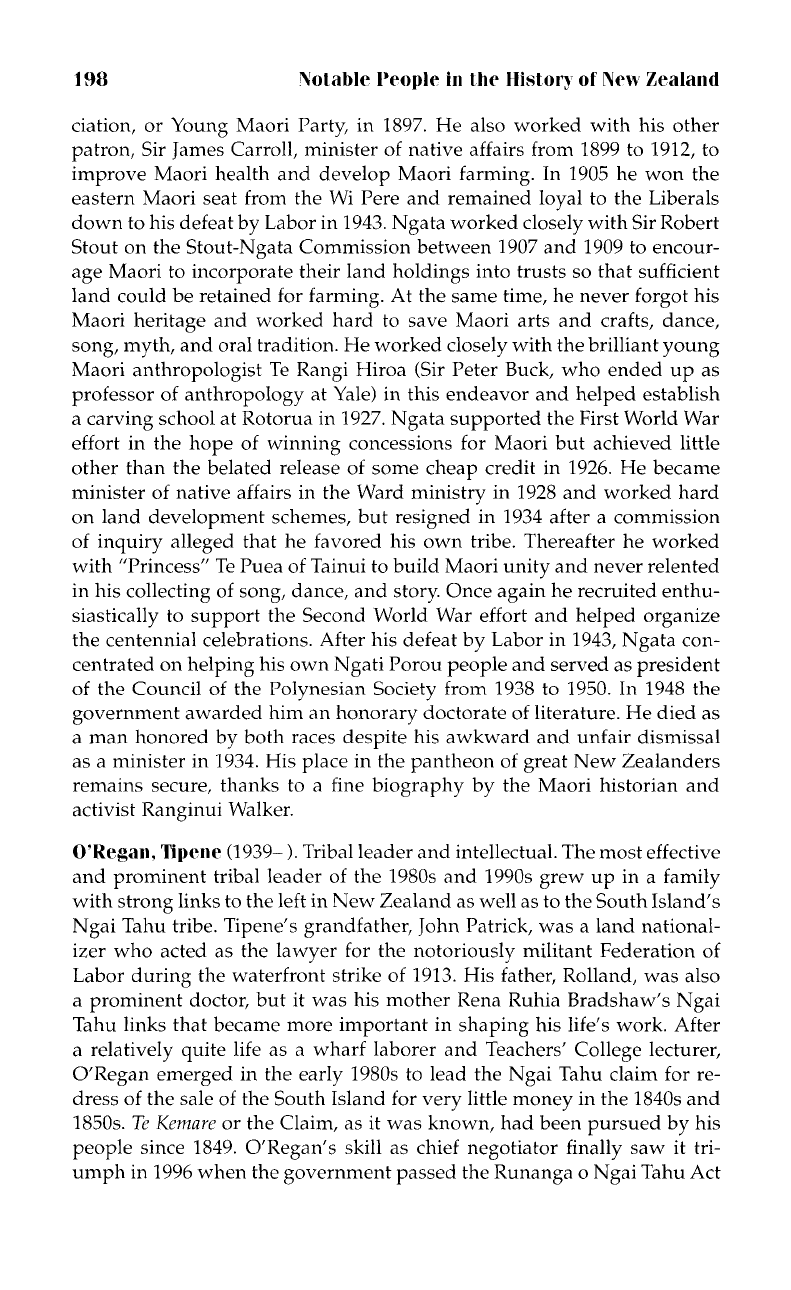
198 Notable People in the History of New Zealand
ciation, or Young Maori Party, in 1897. He also worked with his other
patron, Sir James Carroll, minister of native affairs from 1899 to 1912, to
improve Maori health and develop Maori farming. In 1905 he won the
eastern Maori seat from the Wi Pere and remained loyal to the Liberals
down to his defeat by Labor in
1943.
Ngata worked closely with Sir Robert
Stout on the Stout-Ngata Commission between 1907 and 1909 to encour-
age Maori to incorporate their land holdings into trusts so that sufficient
land could be retained for farming. At the same time, he never forgot his
Maori heritage and worked hard to save Maori arts and crafts, dance,
song, myth, and oral tradition. He worked closely with the brilliant young
Maori anthropologist Te Rangi Hiroa (Sir Peter Buck, who ended up as
professor of anthropology at Yale) in this endeavor and helped establish
a carving school at Rotorua in 1927. Ngata supported the First World War
effort in the hope of winning concessions for Maori but achieved little
other than the belated release of some cheap credit in 1926. He became
minister of native affairs in the Ward ministry in 1928 and worked hard
on land development schemes, but resigned in 1934 after a commission
of inquiry alleged that he favored his own tribe. Thereafter he worked
with "Princess" Te Puea of Tainui to build Maori unity and never relented
in his collecting of song, dance, and story Once again he recruited enthu-
siastically to support the Second World War effort and helped organize
the centennial celebrations. After his defeat by Labor in
1943,
Ngata con-
centrated on helping his own Ngati Porou people and served as president
of the Council of the Polynesian Society from 1938 to 1950. In 1948 the
government awarded him an honorary doctorate of literature. He died as
a man honored by both races despite his awkward and unfair dismissal
as a minister in 1934. His place in the pantheon of great New Zealanders
remains secure, thanks to a fine biography by the Maori historian and
activist Ranginui Walker.
O'Regan, Tipene (1939-). Tribal leader and intellectual. The most effective
and prominent tribal leader of the 1980s and 1990s grew up in a family
with strong links to the left in New Zealand as well as to the South Island's
Ngai Tahu tribe. Tipene's grandfather, John Patrick, was a land national-
izer who acted as the lawyer for the notoriously militant Federation of
Labor during the waterfront strike of 1913. His father, Rolland, was also
a prominent doctor, but it was his mother Rena Ruhia Bradshaw's Ngai
Tahu links that became more important in shaping his life's work. After
a relatively quite life as a wharf laborer and Teachers' College lecturer,
O'Regan emerged in the early 1980s to lead the Ngai Tahu claim for re-
dress of the sale of the South Island for very little money in the 1840s and
1850s. Te
Kemare
or the Claim, as it was known, had been pursued by hi
people since 1849. O'Regan's skill as chief negotiator finally saw it tri-
umph in 1996 when the government passed the Runanga o Ngai Tahu Act
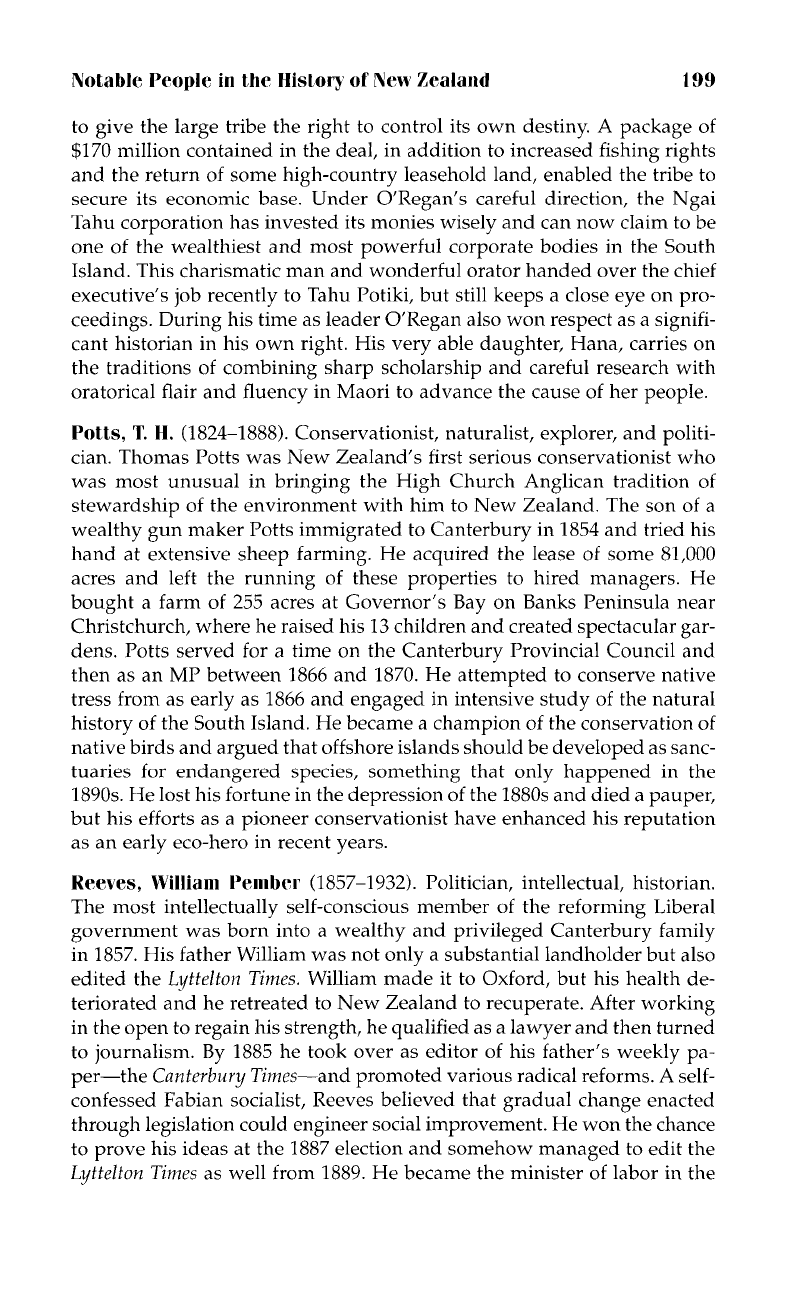
Notable People in the History of New Zealand 199
to give the large tribe the right to control its own destiny. A package of
$170
million contained in the deal, in addition to increased fishing rights
and the return of some high-country leasehold land, enabled the tribe to
secure its economic base. Under O'Regan's careful direction, the Ngai
Tahu corporation has invested its monies wisely and can now claim to be
one of the wealthiest and most powerful corporate bodies in the South
Island. This charismatic man and wonderful orator handed over the chief
executive's job recently to Tahu Potiki, but still keeps a close eye on pro-
ceedings. During his time as leader O'Regan also won respect as a signifi-
cant historian in his own right. His very able daughter, Hana, carries on
the traditions of combining sharp scholarship and careful research with
oratorical flair and fluency in Maori to advance the cause of her people.
Potts,
T. H. (1824-1888). Conservationist, naturalist, explorer, and politi-
cian. Thomas Potts was New Zealand's first serious conservationist who
was most unusual in bringing the High Church Anglican tradition of
stewardship of the environment with him to New Zealand. The son of a
wealthy gun maker Potts immigrated to Canterbury in 1854 and tried his
hand at extensive sheep farming. He acquired the lease of some 81,000
acres and left the running of these properties to hired managers. He
bought a farm of 255 acres at Governor's Bay on Banks Peninsula near
Christchurch, where he raised his
13
children and created spectacular gar-
dens.
Potts served for a time on the Canterbury Provincial Council and
then as an MP between 1866 and 1870. He attempted to conserve native
tress from as early as 1866 and engaged in intensive study of the natural
history of the South Island. He became a champion of the conservation of
native birds and argued that offshore islands should be developed as sanc-
tuaries for endangered species, something that only happened in the
1890s. He lost his fortune in the depression of the 1880s and died a pauper,
but his efforts as a pioneer conservationist have enhanced his reputation
as an early eco-hero in recent years.
Reeves, William
Pember
(1857-1932). Politician, intellectual, historian.
The most intellectually self-conscious member of the reforming Liberal
government was born into a wealthy and privileged Canterbury family
in
1857.
His father William was not only a substantial landholder but also
edited the Lyttelton Times. William made it to Oxford, but his health de-
teriorated and he retreated to New Zealand to recuperate. After working
in the open to regain his strength, he qualified as a lawyer and then turned
to journalism. By 1885 he took over as editor of his father's weekly pa-
per—the
Canterbury
Times—and
promoted various radical reforms. A
self-
confessed Fabian socialist, Reeves believed that gradual change enacted
through legislation could engineer social improvement. He won the chance
to prove his ideas at the 1887 election and somehow managed to edit the
Lyttelton Times as well from 1889. He became the minister of labor in the
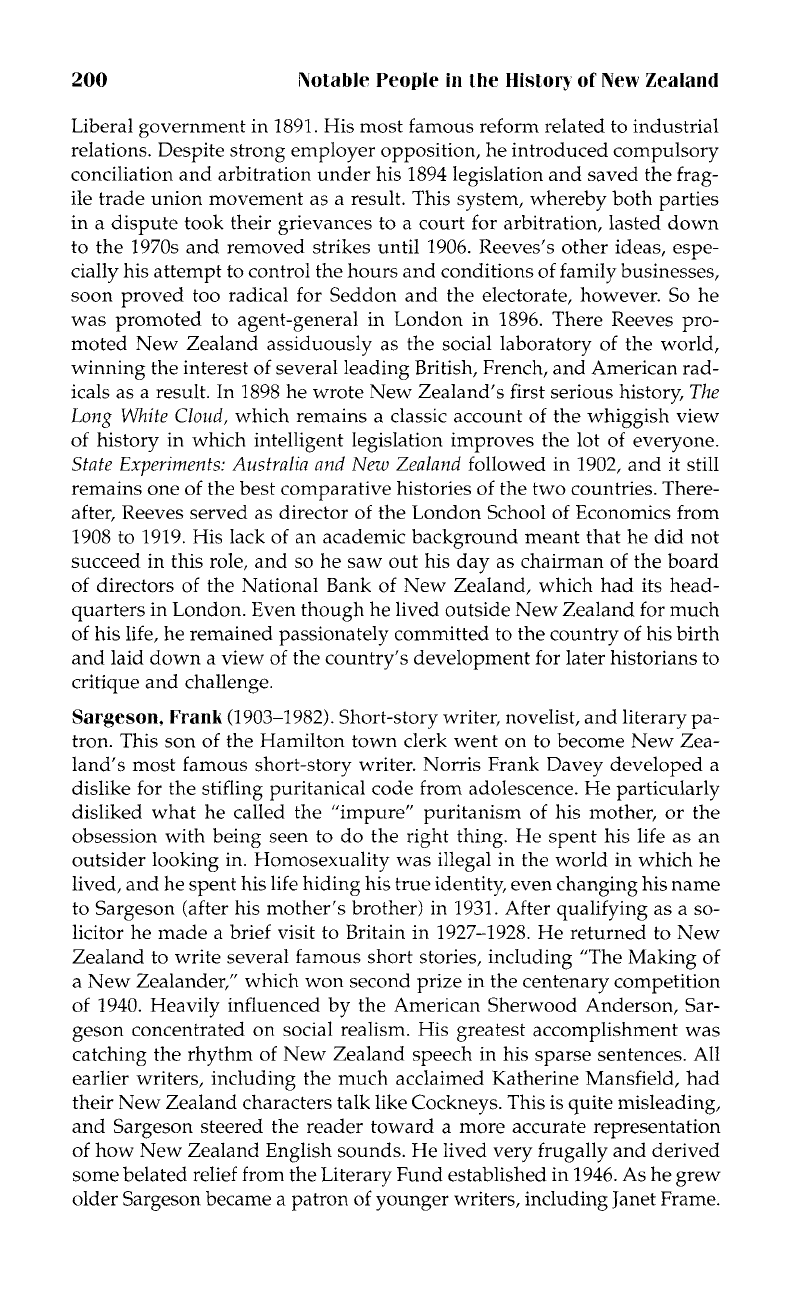
200
Notable People in the History of New Zealand
Liberal government in
1891.
His most famous reform related to industrial
relations. Despite strong employer opposition, he introduced compulsory
conciliation and arbitration under his 1894 legislation and saved the frag-
ile trade union movement as a result. This system, whereby both parties
in a dispute took their grievances to a court for arbitration, lasted down
to the 1970s and removed strikes until 1906. Reeves's other ideas, espe-
cially his attempt to control the hours and conditions of family businesses,
soon proved too radical for Seddon and the electorate, however. So he
was promoted to agent-general in London in 1896. There Reeves pro-
moted New Zealand assiduously as the social laboratory of the world,
winning the interest of several leading British, French, and American rad-
icals as a result. In 1898 he wrote New Zealand's first serious history, The
Long White
Cloud,
which remains a classic account of the whiggish view
of history in which intelligent legislation improves the lot of everyone.
State Experiments: Australia and New Zealand followed in 1902, and it still
remains one of the best comparative histories of the two countries. There-
after, Reeves served as director of the London School of Economics from
1908 to 1919. His lack of an academic background meant that he did not
succeed in this role, and so he saw out his day as chairman of the board
of directors of the National Bank of New Zealand, which had its
head-
quarters in London. Even though he lived outside New Zealand for much
of his life, he remained passionately committed to the country of his birth
and laid down a view of the country's development for later historians to
critique and challenge.
Sargeson, Frank (1903-1982). Short-story writer, novelist, and literary pa-
tron. This son of the Hamilton town clerk went on to become New Zea-
land's most famous short-story writer. Norris Frank
Davey
developed a
dislike for the stifling puritanical code from adolescence. He particularly
disliked what he called the "impure" puritanism of his mother, or the
obsession with being seen to do the right thing. He spent his life as an
outsider looking in. Homosexuality was illegal in the world in which he
lived, and he spent his
life
hiding his true identity, even changing his name
to Sargeson (after his mother's brother) in 1931. After qualifying as a so-
licitor he made a brief visit to Britain in 1927-1928. He returned to New
Zealand to write several famous short stories, including "The Making of
a New Zealander," which won second prize in the centenary competition
of 1940. Heavily influenced by the American Sherwood Anderson, Sar-
geson concentrated on social realism. His greatest accomplishment was
catching the rhythm of New Zealand speech in his sparse sentences. All
earlier writers, including the much acclaimed Katherine Mansfield, had
their New Zealand characters talk like Cockneys. This is quite misleading,
and Sargeson steered the reader toward a more accurate representation
of how New Zealand English sounds. He lived very frugally and derived
some belated relief from the Literary Fund established in
1946.
As he grew
older Sargeson became a patron of younger writers, including Janet Frame.
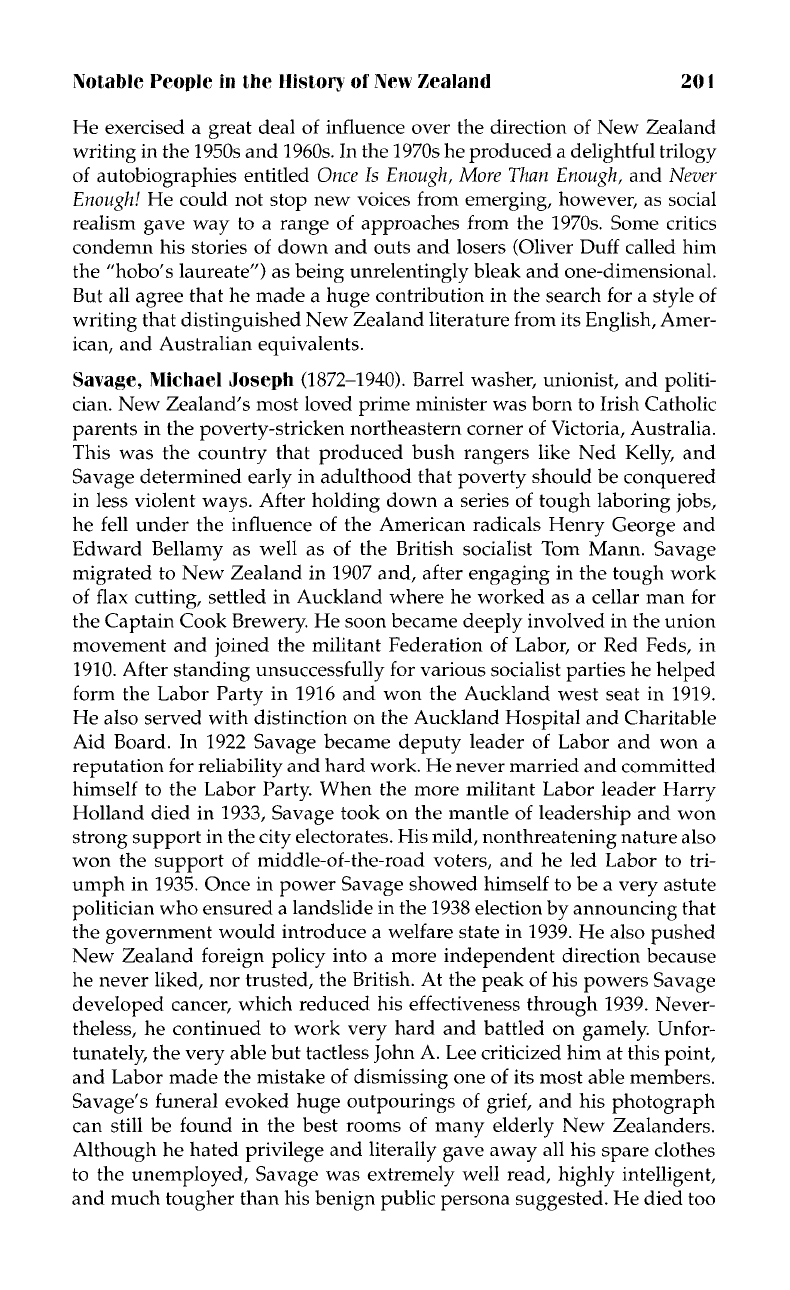
Notable People in the History of New Zealand
201
He exercised a great deal of influence over the direction of New Zealand
writing in the
1950s
and 1960s. In the
1970s
he produced a delightful trilogy
of autobiographies entitled Once Is Enough, More Than Enough, and Never
Enough! He could not stop new voices from emerging, however, as social
realism gave way to a range of approaches from the 1970s. Some critics
condemn his stories of down and outs and losers (Oliver Duff called him
the "hobo's laureate") as being unrelentingly bleak and one-dimensional.
But all agree that he made a huge contribution in the search for a style of
writing that distinguished New Zealand literature from its English, Amer-
ican, and Australian equivalents.
Savage, Michael Joseph (1872-1940). Barrel washer, unionist, and politi-
cian. New Zealand's most loved prime minister was born to Irish Catholic
parents in the poverty-stricken northeastern corner of Victoria, Australia.
This was the country that produced bush rangers like Ned Kelly, and
Savage determined early in adulthood that poverty should be conquered
in less violent ways. After holding down a series of tough laboring jobs,
he fell under the influence of the American radicals Henry George and
Edward Bellamy as well as of the British socialist Tom Mann. Savage
migrated to New Zealand in 1907 and, after engaging in the tough work
of flax cutting, settled in Auckland where he worked as a cellar man for
the Captain Cook Brewery. He soon became deeply involved in the union
movement and joined the militant Federation of Labor, or Red Feds, in
1910.
After standing unsuccessfully for various socialist parties he helped
form the Labor Party in 1916 and won the Auckland west seat in 1919.
He also served with distinction on the Auckland Hospital and Charitable
Aid Board. In 1922 Savage became deputy leader of Labor and won a
reputation for reliability and hard work. He never married and committed
himself to the Labor Party. When the more militant Labor leader Harry
Holland died in 1933, Savage took on the mantle of leadership and won
strong support in the city electorates. His mild, nonthreatening nature also
won the support of middle-of-the-road voters, and he led Labor to tri-
umph in
1935.
Once in power Savage showed himself to be a very astute
politician who ensured a landslide in the
1938
election by announcing that
the government would introduce a welfare state in 1939. He also pushed
New Zealand foreign policy into a more independent direction because
he never liked, nor trusted, the British. At the peak of his powers Savage
developed cancer, which reduced his effectiveness through 1939. Never-
theless, he continued to work very hard and battled on gamely. Unfor-
tunately, the very able but tactless John A. Lee criticized him at this point,
and Labor made the mistake of dismissing one of its most able members.
Savage's funeral evoked huge outpourings of
grief,
and his photograph
can still be found in the best rooms of many elderly New Zealanders.
Although he hated privilege and literally gave away all his spare clothes
to the unemployed, Savage was extremely well read, highly intelligent,
and much tougher than his benign public persona suggested. He died too

202
Notable People in the History of New Zealand
soon to be ranked as a great prime minister, but no other leader has been
so adored by the public, nor has any other assumed so much iconographic
significance.
Seddon, Richard John (1845-1906). Storekeeper, bush lawyer, and pop-
ulist politician. The large and ebullient son of Lancashire and Scottish
schoolteachers went on to become arguably New Zealand's most effective
prime minister. After forgoing a career as a skilled artisan in the metal
trades in St. Helens, Seddon moved to the Victorian gold rushes in 1863.
He stayed there briefly, working in the railway workshops and marrying
before immigrating to the west coast of New Zealand in 1866. After a brief
stint in hydraulic mining building dams and races, Seddon became a
storekeeper, publican, and miners' advocate at Kumara. There he devel-
oped a power base among the egalitarian gold miners, rising to become
mayor in
1877.
Like McKenzie, Seddon's career as a backbencher after his
entry to parliament in 1879 was not especially distinguished, except as a
champion of the mining industry, but he impressed as minister of public
works in the new Liberal government. When Ballance became ill, Seddon
took over the job of premier and then won it against the challenge from
Sir Robert Stout, who had been out of the house. A brilliant populist
politician with a fierce commitment to democracy, Seddon won the hearts
and minds of the electorate so completely that he remained premier down
to his death in 1906. Affectionately known as King Dick, he trumpeted
every Liberal success to the world and helped win New Zealand's repu-
tation as the social laboratory of the world. He also was an ardent impe-
rialist who declared war on the Boers before the British government in
1899,
annexed the Cook Islands in 1901, and promoted New Zealand's
interests unashamedly at imperial conferences and royal jubilees. Essen-
tially a pragmatist, Seddon contributed little to the Liberal reform pro-
gram other than ensuring that difficult legislation passed into law. He did
have a humanitarian streak, though, and took great pleasure from making
secondary education available to academically able children from 1903.
He also championed the introduction of a very miserly old age pension
in 1898 and had hospitals built for working-class mothers in 1905. Al-
though he fancied his ability to get on well with Maori, he did little for
their welfare apart from granting a modicum of self-government in 1900.
Seddon also expressed vehemently racist prejudice towards the Chinese
and other Asians, whom he saw as threats to the high living standards
achieved in what he called "God's own country." Such prejudice only
added to his electoral appeal, and he became a kind of benevolent dictator
^before
his death, serving as minister of practically everything. No other
New Zealand politician would ever dominate his cabinet or manipulate
the electorate to such great effect as this antipodean Andrew Jackson.
Sheppard, Kate (1847-1934). Woman's suffragist, temperance advocate,
and intellectual. This charismatic leader of the women's suffrage move-
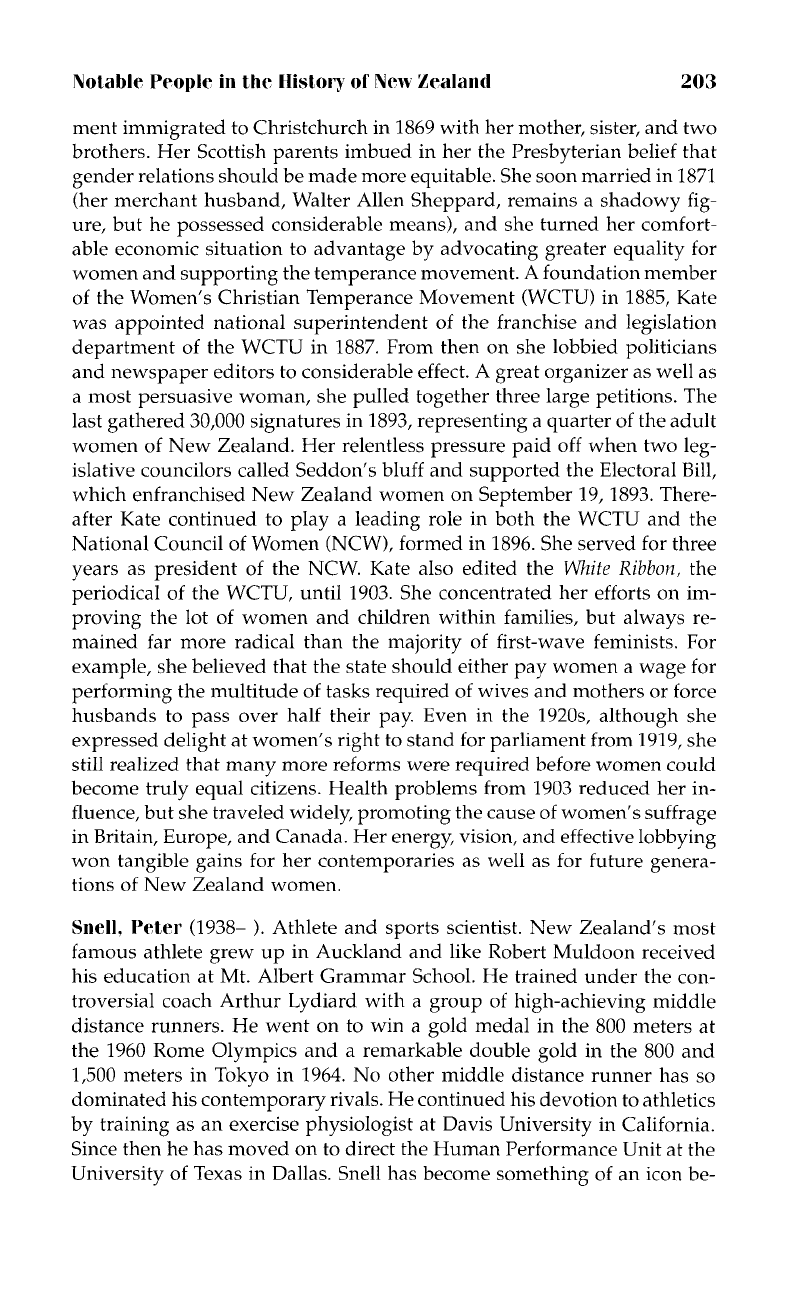
Notable People in the History of New Zealand
203
ment
immigrated to Christchurch in 1869 with her mother, sister, and two
brothers. Her Scottish parents imbued in her the Presbyterian belief that
gender relations should be made more equitable. She soon married in
1871
(her merchant husband, Walter Allen Sheppard, remains a shadowy fig-
ure,
but he possessed considerable means), and she turned her comfort-
able economic situation to advantage by advocating greater equality for
women and supporting the temperance movement. A foundation member
of the Women's Christian Temperance Movement (WCTU) in 1885, Kate
was appointed national superintendent of the franchise and legislation
department of the WCTU in 1887. From then on she lobbied politicians
and newspaper editors to considerable effect. A great organizer as well as
a most persuasive woman, she pulled together three large petitions. The
last gathered 30,000 signatures in
1893,
representing a quarter of the adult
women of New Zealand. Her relentless pressure paid off when two leg-
islative councilors called Seddon's bluff and supported the Electoral Bill,
which enfranchised New Zealand women on September
19,1893.
There-
after Kate continued to play a leading role in both the WCTU and the
National Council of Women (NCW), formed in 1896. She served for three
years as president of the NCW. Kate also edited the White Ribbon, the
periodical of the WCTU, until
1903.
She concentrated her efforts on im-
proving the lot of women and children within families, but always re-
mained far more radical than the majority of
first-wave
feminists. For
example, she believed that the state should either pay women a wage for
performing the multitude of tasks required of wives and mothers or force
husbands to pass over half their pay Even in the 1920s, although she
expressed delight at women's right to stand for parliament from
1919,
she
still realized that many more reforms were required before women could
become truly equal citizens. Health problems from 1903 reduced her in-
fluence, but she traveled widely, promoting the cause of women's suffrage
in Britain, Europe, and Canada. Her energy, vision, and effective lobbying
won tangible gains for her contemporaries as well as for future genera
tions of New Zealand women.
Snell,
Peter (1938- ). Athlete and sports scientist. New Zealand's most
famous athlete grew up in Auckland and like Robert Muldoon received
his education at Mt. Albert Grammar School. He trained under the con-
troversial coach Arthur Lydiard with a group of high-achieving middle
distance runners. He went on to win a gold medal in the 800 meters at
the 1960 Rome Olympics and a remarkable double gold in the 800 and
1,500 meters in Tokyo in 1964. No other middle distance runner has so
dominated his contemporary rivals. He continued his devotion to athletics
by training as an exercise physiologist at Davis University in California.
Since then he has moved on to direct the Human Performance Unit at the
University of Texas in Dallas. Snell has become something of an icon be-
